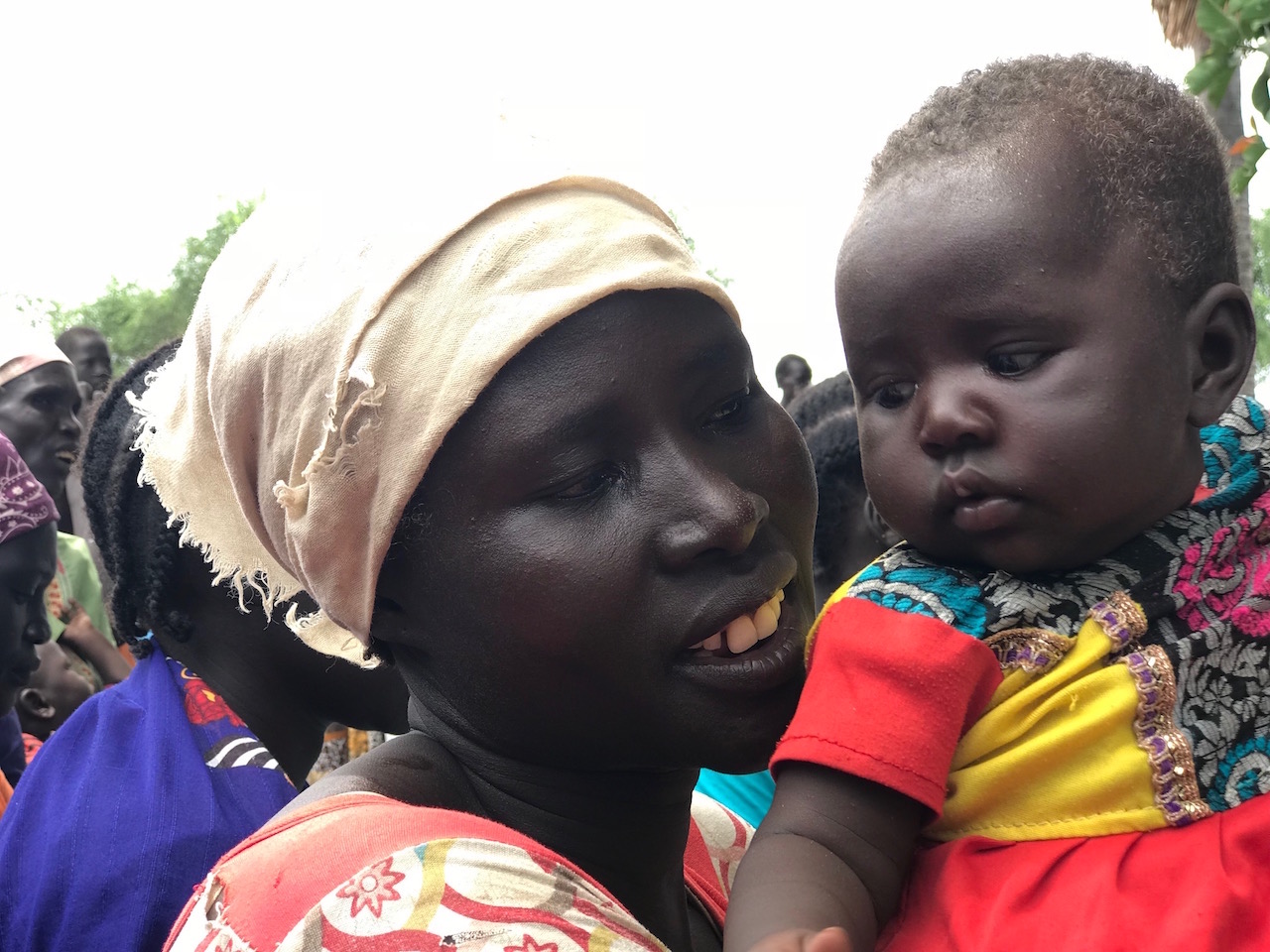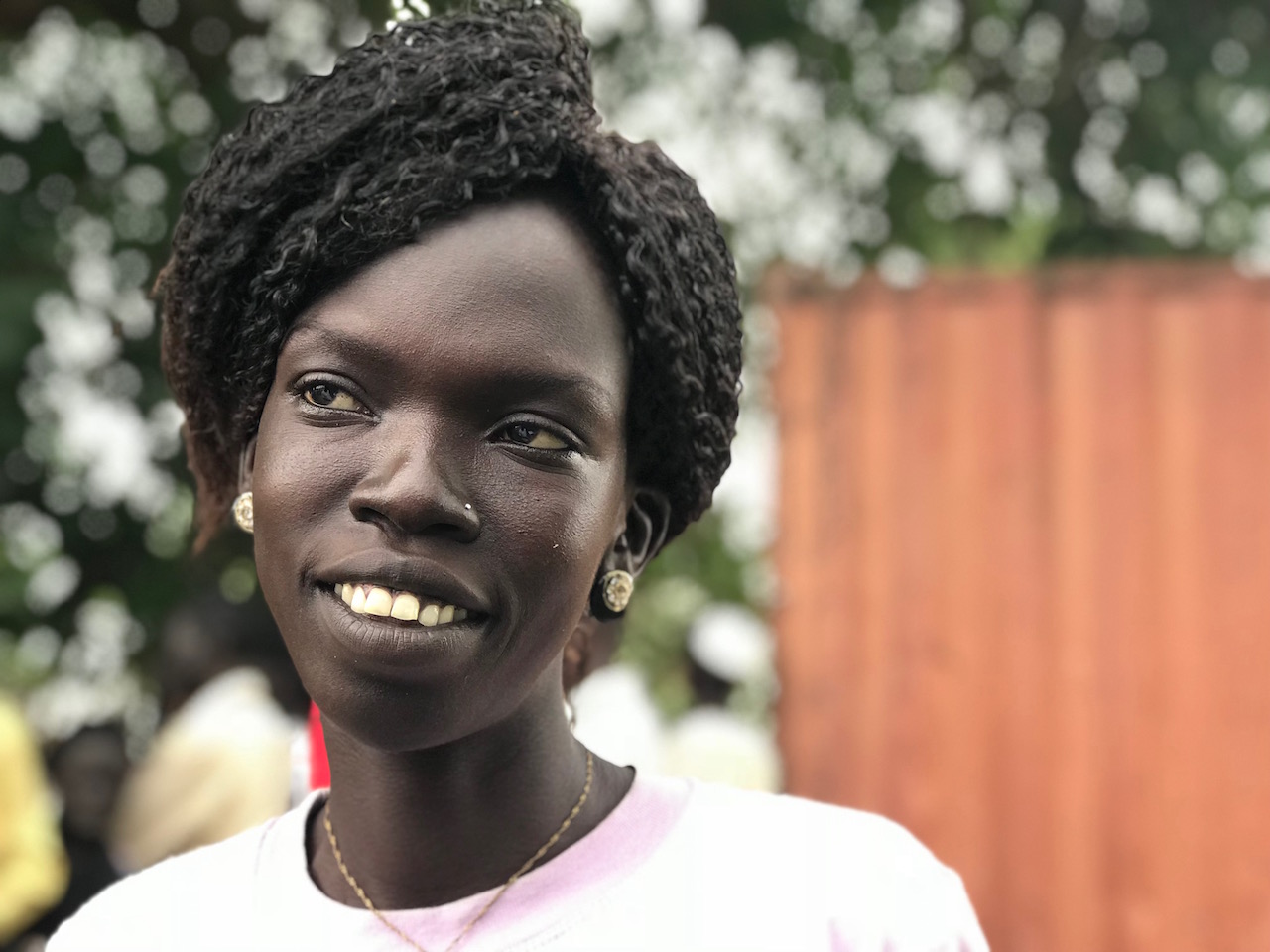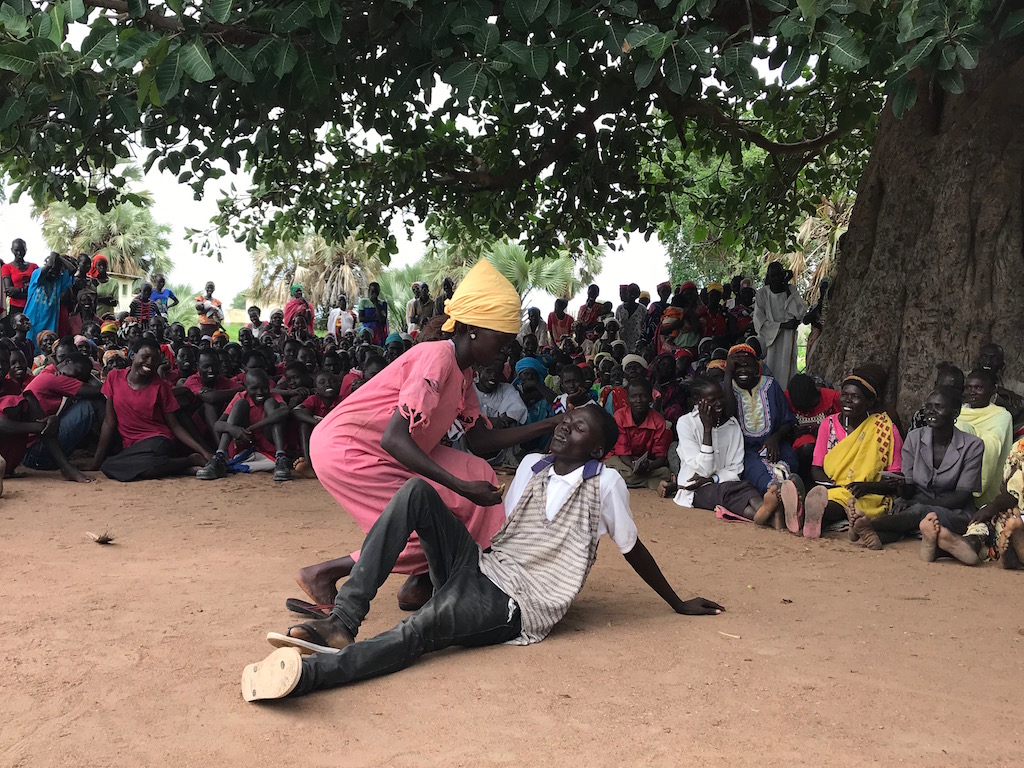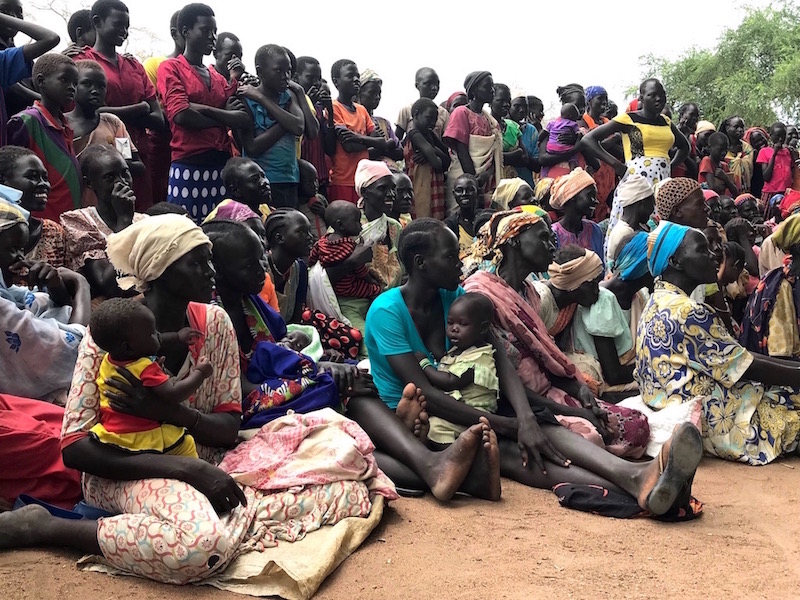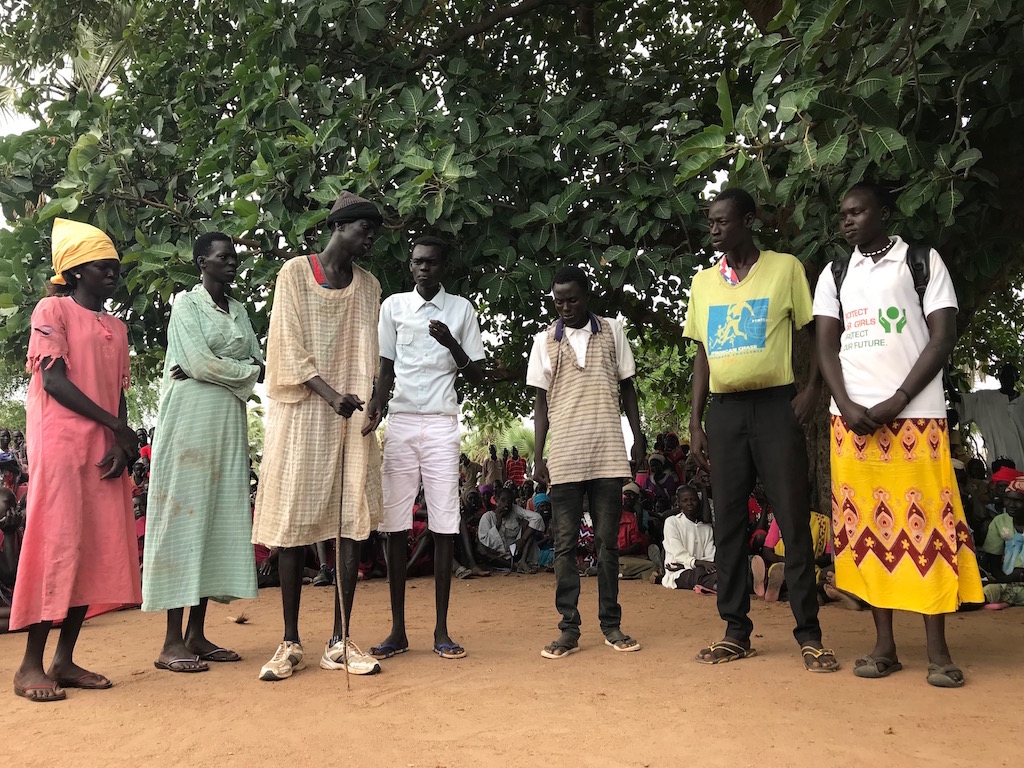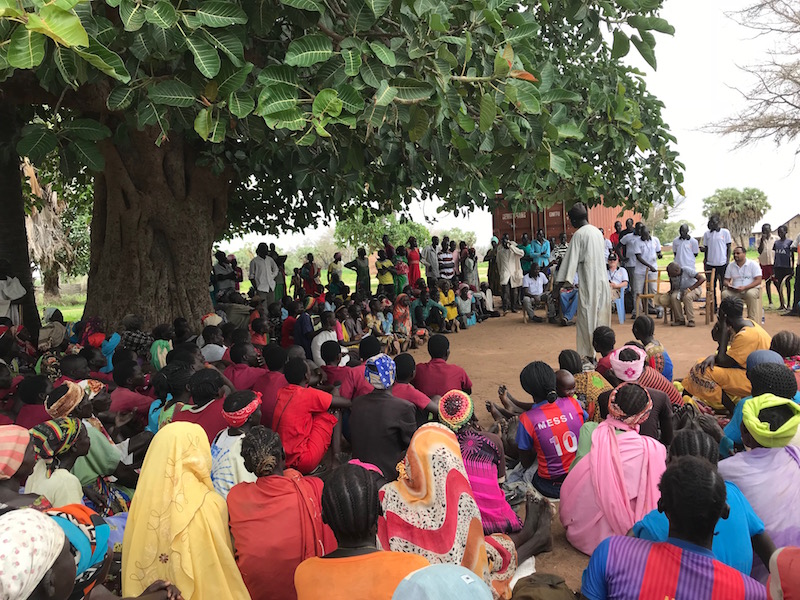Changing attitudes and behaviours on gender-based violence through role play in South Sudan
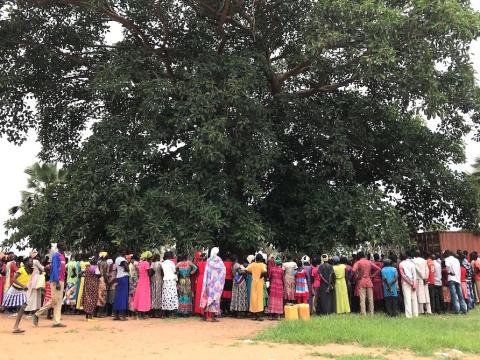
The shady and huge acacia tree in Aweil started to fill up with vibrant colours as people, mostly women, arrived to watch a local drama unfold. Some were comfortably seated on the ground while others were standing, most of those at the back stretching eagerly to make sure to have full view of what was about to happen.
When the live role-play in this open theatre started, the otherwise restless audience grew quiet, focused intently on what happens next. As it progressed, a punctuation of laughter became frequent. That one show time in Aweil, 700 people came to watch the drama showing how gender-based violence can affect women, girls, boys and men; the community as a whole.
35-year old Abuk Deng and and 3-months old daughter Aker are among the people who watched and enjoyed the gender-based violence role play under the huge acacia tree.
Eighteen-year old Susana Aner was among the eight boys and girls turned community advocates trained on role-playing to share the harms of gender-based violence and other forms of violence that are happening around Northern Bahr El Gazal communities, and how families and communities can come together to prevent and end these practices.
She shared how proud she is of being a part of the group and adds, “The play educates people in a very creative way and helps keep children in school because their parents can start to understand the value of education for their children, especially girls. It also gives us the chance to express our skills in a useful way.”
The group is well-trained, and are natural performers, keeping their audience on their toes as they witness the realities of what is happening in their own households, and what a brighter future without gender-based violence could look like. Daniel Dut Malek, after watching the play, said he is hopeful that the parents will take care of their girls and boys having seen what physical violence and forced marriage can do to their wellbeing and future, especially girls.
According to Lona Tabu, World Vision’s Gender-Based Violence and Protection Coordinator in Northern Bahr El Gazal State early and forced marriage, as well as, domestic violence are very common practices in the communities. She added that conflict, displacement and the deteriorated economic situation also contribute, making violence a frequent occurrence in many South Sudanese homes.
Susana, 18, is one of the active members of the drama group bringing the advocacy to the villages in Northern Bahr El Gazal State.
She explains, “The mother may have nothing to prepare, the husband will often beat his wife over the preparation of the food, and tensions are increased because the man cannot provide for his family.”
Tabu adds, “Violence in the home, against women or against children is too common. Many see what is shown in our dramas in their homes every day, but this helps to bring the issue to the open, to have discussion. It is the first start to thinking differently and talking more about changing.”
The drama group shares the story of a young married couple and the challenges they face taking on the responsibility early.
It becomes a vicious cycle. When a girl becomes 15 years of age or so, they will be forced to marry due to cultural beliefs and for the parents to receive the dowry, which is often paid in form of cows and money by the future husband. Depending on the girl’s status in the village, the parents can get as much as 80 or more cows as dowry, which provides a strong financial motivation to continue the practice.
Lona says, “They laugh hard at the role play because they see themselves on it. But they also see the pain it causes for the girl and think about changing.”
“The challenges are complex and require a lot of interactive engagement with communities. But by integrating these dramas against gender-based violence in our food security program, we are able to gain a captive audience initially more interested in agriculture. This helps to share creatively, to transform the way people think and shift their attitudes about violence against women and children,” shares Biruk Kebede, World Vision’s Project Manager.
Abuk Deng and hundreds of mothers laughed and learned at the role play, seeing what is going on in their households being performed by the group.
Australian Government’s Department of Foreign Affairs and Trade (DFAT), through the Humanitarian Partnership Agreement (HPA) South Sudan Response (Africa) Project that covers Northern Bahr El Gazal and Unity State, funds the Food Security and Livelihood Program that has integrated community-based awareness campaigns on gender-based violence among its over 90,000 beneficiaries.
With an estimated population of over 12 million, a recent trend study from What Works to Prevent Violence found 65% of women and girls have experienced sexual or physical gender-based violence South Sudan, among the highest rates in the world, with intimate partner (or domestic) violence as having the most frequent occurrence.
The talented advocates of World Vision's campaign against gender-based violence take a bow after the much-applauded presentation.
At least 52% of adolescent girls and women are early or forcibly married, with rural areas similar to Aweil experiencing rates as high as 78%. “Gender-based violence is pervasive against women and girls in South Sudan, and is devastating especially in rural areas,” says Lyndsay Hockin, World Vision’s Senior Protection & Gender Advisor.
“To reduce gender-based violence, we need to help communities start to talk openly about this, especially women, the harm it causes, and what a brighter future without this violence could look like”, Hockin adds.
To help address this, World Vision’s Protection Program works to increase awareness and promote positive social change to empower communities to better understand, prevent and mitigate gender-based violence and violations of children’s rights, with an emphasis on promoting gender equality.
It further aims to help improve access to comprehensive child protection and GBV response services for survivors of GBV and children of concern. World Vision nationally advocates for an end to violence against children, and forms of violence that affect the family, such as gender-based violence.
The community comes together and learn from the campaign. According to Lona Tabu, the effort is gaining ground as most of the people now identify the forms of violence and their roles to prevent them from happening in their homes.
Through its campaign “It Takes A Nation to Protect the Future Generation,” it partners with communities, NGOs and the international community to change attitudes and behaviours that contribute to violence, support prevention and response to protection concerns.
It also aims to promote accountability for international commitments to South Sudan to help end violence children and all forms of gender-based violence.
